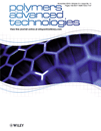Studies on NO releasing from PCU grafted with endogenous NO donors
Abstract
Films of PCUs grafted with L-nitrosocysteine (L-CySNO) were successfully prepared in the presence of 3-aminopropyltriethoxysilane (APTES). The final products (L-CySNO-grafted PCU) were characterized with ATR-FTIR, SEM, XPS, and tensile strength measurement. Tensile strength of the L-CySNO-grafted PCU was decreased compared to that of non-grafted PCU. In vitro NO release from the produced films was obtained by using ascorbic acid (Vc) as reducing agent, and the velocity of the released NO was measured by the Griess assay. The effects of temperature, molecular weight of polycarbonate diols (PCN), and thickness of the films on in vitro NO release were investigated in detail. It was found that with the increase of temperature, the velocity of NO release increased, whereas with the increase of molecular weight of polycarbonate diols, the velocity decreased. However, thickness of PCU films has no effect on NO release. The results of cytotoxicity test and hemolytic test indicate that blood compatibility and biocompatibility of the grafted PCU are better than those of the synthesized PCU. Copyright © 2009 John Wiley & Sons, Ltd.




